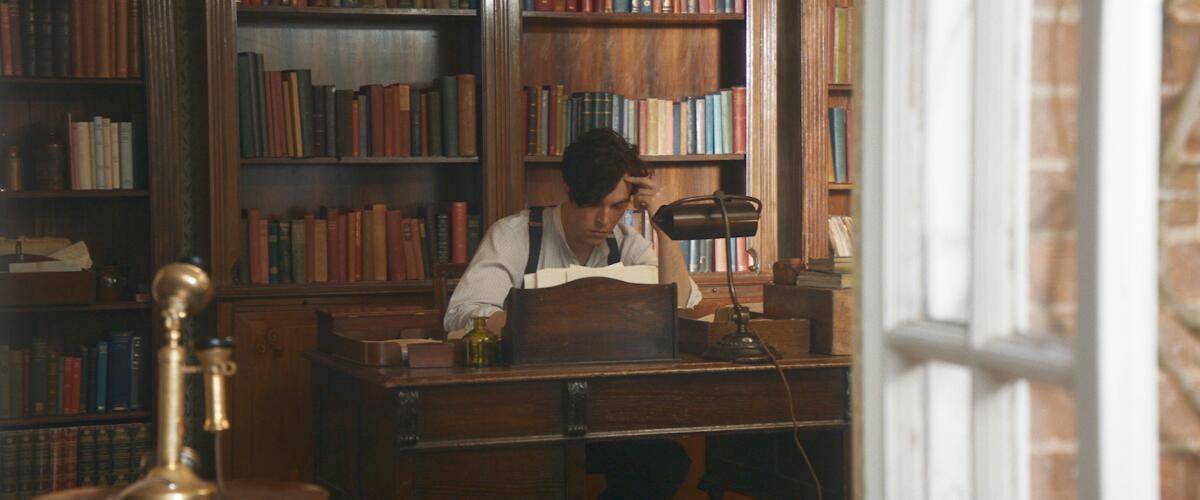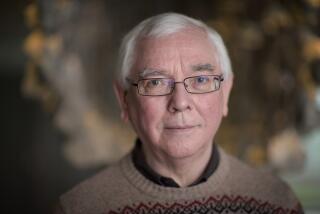Depicting writers on film is hard, but ‘The Laureate’ has its moments

- Share via
The Times is committed to reviewing theatrical film releases during the COVID-19 pandemic. Because moviegoing carries risks during this time, we remind readers to follow health and safety guidelines as outlined by the Centers for Disease Control and Prevention and local health officials.
The writing process is notoriously hard to depict onscreen in captivating ways, and “The Laureate,” a bio-drama about British war poet and author Robert Graves, is no exception. But when a film like this, which aims to immerse us in a bygone world of creative inspiration and output, can’t sufficiently capture the grit, joy and catharsis of artistic achievement, it undercuts much of its potential power.
This is not to say that “The Laureate,” from writer-producer-director William Nunez, isn’t often watchable as it effectively re-creates the Roaring ’20s — and flashes of World War I — on a limited budget. The story of Graves (Tom Hughes) and his romantic and emotional entanglements, as he sets out to recapture his poetic mojo after a career-threatening dry spell, moves in some twisty and unpredictable directions — unless, of course, you’ve already read his acclaimed 1929 autobiography, “Good-Bye to All That.”
The film is nicely framed by a spoken letter Graves’ illustrator wife, Nancy Nicholson (Laura Haddock), writes to him reflecting on their unconventional relationship. “If you invite a serpent into your home, perhaps you shouldn’t be surprised if it bites you,” she ominously contends at the start. This leads her to recall the arrival of said troublemaker, New York poet Laura Riding (Dianna Agron), whom Graves and Nicholson ask to stay with them in their English country cottage (a.k.a. World’s End) after being impressed by her work in a literary magazine. The hope: that Riding will motivate the blocked Graves and even write with him.
As presented here, it’s a rash and short-sighted proposal but, well, desperate times and all.
The vibrant, unbridled Riding swoops into the lives of Graves and Nicholson — and their young daughter, Catherine (Indica Watson) — like a literary Mary Poppins. She soon has the place humming with spirit and creativity and, before you can say “muse and lover,” is bedding down with Graves and Nicholson — both together and apart. Nothing like a little modern love to shake out the cobwebs and get a poet writing again.
But a disturbing sequence between Riding and the impressionable Catherine lets us know that all’s not right in the American’s psyche and the nirvana that’s blossomed at World’s End may be short-lived.
The action shifts to London, where Graves moves with Riding after he’s hired to write the biography of British archaeologist T.E. Lawrence (better known as Lawrence of Arabia). But Riding, to the consternation of such writer cohorts of Graves as T.S. Eliot (Christian Anholt) and Siegfried Sassoon (Timothy Renouf), turns particularly brash and controlling as they party their way across the big city.
Riding eventually draws fetching, aspiring Irish poet Geoffrey (Fra Fee) into what she calls her and Graves’ “holy circle” — and another ménage à trois is born. Reenter Nicholson to alter the dynamics of that increasingly fraught troika and recalibrate her own uncertain future.
Unfortunately, the film loses its center early on, as Riding and her manipulations drive much of the action and Graves’ ambitions get a bit lost in the shuffle. If Riding is a first-class provocateur and seductress, her deeper motives often feel unclear. She’s a character who largely bobs along the surface, and Agron doesn’t plumb any unscripted dimensions.
Hughes lends Graves a worthy mix of dash and sensitivity, though the strange wartime trauma that plagues the poet years later tends to hobble his performance rather than inform it.
Haddock proves the beating heart of the piece, infusing her role with a quiet strength, determination and equitability; neither plucky enabler nor long-suffering victim but something believably fresher and more heroic. Maybe she should have been the film’s true focus.
'The Laureate'
Rated: R, for sexual content, nudity and language
Running time: 1 hour, 42 minutes
Playing: Starts Jan. 21, Cinelounge Sunset, Hollywood; also on VOD
More to Read
Only good movies
Get the Indie Focus newsletter, Mark Olsen's weekly guide to the world of cinema.
You may occasionally receive promotional content from the Los Angeles Times.










